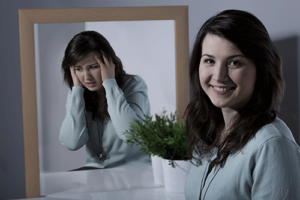 Bipolar disorder is a mental health condition that is characterized by extreme highs and lows in mood and energy. These shifts can be so severe that they interfere with a person’s ability to carry out their day-to-day activities. For many people with bipolar disorder, these mood swings can also lead to substance abuse or can be worsened by substance abuse.
Bipolar disorder is a mental health condition that is characterized by extreme highs and lows in mood and energy. These shifts can be so severe that they interfere with a person’s ability to carry out their day-to-day activities. For many people with bipolar disorder, these mood swings can also lead to substance abuse or can be worsened by substance abuse.
If you or someone you love is struggling with bipolar disorder and substance abuse, it’s important to seek professional help. Roaring Brook Recovery offers comprehensive mental health treatment programs that include cognitive-behavioral therapy (CBT), trauma therapy, group therapy, and other evidence-based approaches. Our goal is to help our participants develop the coping skills they need to manage their bipolar disorder and substance use issues.
Our mental health treatment services are part of a comprehensive approach to addiction treatment. While we don’t offer standalone mental health treatment, this approach helps us to support addiction treatment program participants as they work toward recovery in every aspect of their lives.
Call 855.590.9944 today if you’re interested in learning more about our bipolar disorder treatment program in Lexington, KY.
What Is Bipolar Disorder?
Bipolar disorder, also known as manic-depressive illness, is a mental disorder that causes unusual shifts in mood, energy, activity levels, and the ability to carry out day-to-day activities. These changes can be so severe that they interfere with work, school, and personal relationships.
People with bipolar disorder often experience periods of mania or hypomania (an elevated mood that is not as severe as mania). During these periods, they may feel extremely happy, energetic, or irritable. They may also have grandiose ideas, sleep less than usual, and take risks that they wouldn’t normally take (such as spending sprees or impulsive sex). On the other hand, people with bipolar disorder may also experience periods of depression where they feel hopelessness, fatigue, and guilt. It’s important to note that everyone experiences mood swings from time to time; however, for people with bipolar disorder, these swings are much more extreme.
Some of the most common symptoms of bipolar disorder include:
- Extreme mood swings (e.g., going from feeling very happy to feeling very sad or angry)
- Increased energy and activity levels during manic periods
- Reduced need for sleep during manic periods
- Poor concentration
- Difficulty making decisions
- Acting impulsively
- Depression symptoms (e.g., feeling hopeless, helpless, or worthless)
- Anxiety symptoms (e.g., feeling restless or irritable)
It’s important to seek professional help if you think you or someone you love may be struggling with bipolar disorder. Roaring Brook Recovery offers a comprehensive treatment program that can help.
Bipolar Disorder and Substance Abuse
Many of those with bipolar disorder also have a substance use disorder. There are a number of reasons why people with bipolar disorder turn to substances like alcohol or drugs. For some people, substances help them cope with the symptoms of their illness. Others may use substances in an attempt to self-medicate their symptoms. Others may use substances during periods of mania or hypomania in order to heighten their feelings of happiness or energy. However, regardless of the reason why someone uses substances while they’re struggling with bipolar disorder, it’s important to seek professional help as soon as possible.
How Bipolar Disorder Treatment at Roaring Brook Recovery Can Help
At Roaring Brook Recovery, we understand how difficult it can be to live with bipolar disorder; however, we also know that recovery is possible. Our team of experienced professionals will work closely with you to create a personalized treatment plan that meets your unique needs. We offer a variety of evidence-based therapies, such as cognitive-behavioral therapy (CBT), trauma therapy, group therapy, and more. We also place a strong emphasis on family involvement because we know that recovery takes a team effort.
Reach Out to Roaring Brook Recovery
If you’re ready to take the first step towards recovery from bipolar disorder and substance abuse, contact Roaring Brook Recovery today at 855.590.9944 or reach out to us online.

